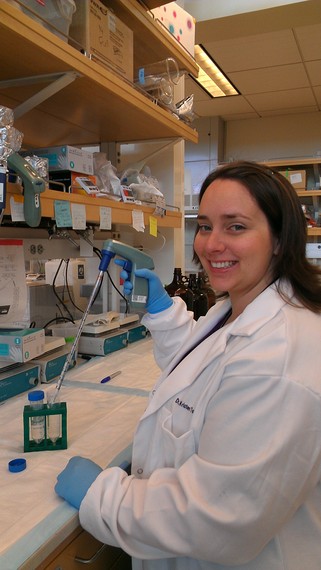As the President of Christian Women in Science (CWIS, part of the American Scientific Affiliation), I hear many stories about the struggles of women of this faith who are interested or work in science, technology, engineering and math. Some stories are encouraging, but others are enough to break my heart.
 Rochelle was a high school biology student who was excited about the advances in genetics that her teacher shared with her in school. She dreamed of making a difference in the world by doing medical research. However, when her church youth leader told her that there were too many gaps in the fossil record to believe evolution and that only atheists believed in evolution, Rochelle's sense of direction began to waver. If she became a medical researcher, would she have to give up her Christian friends?
Rochelle was a high school biology student who was excited about the advances in genetics that her teacher shared with her in school. She dreamed of making a difference in the world by doing medical research. However, when her church youth leader told her that there were too many gaps in the fossil record to believe evolution and that only atheists believed in evolution, Rochelle's sense of direction began to waver. If she became a medical researcher, would she have to give up her Christian friends?
Liz had enjoyed her 10 years as a geology professor at a mid-sized state college. She rarely talked about being a Christian, but recently the subject came up when she told her department head about spending her weekend serving supper at the local Christian mission, and telling people about the love of Jesus. A couple months later her application for tenure was turned down. She never got a clear explanation of why she was rejected. As Liz found, being a Christian and a scientist in a secular institution can feel like being a "lesbian still in the closet."
Terry was a successful chemist and leader at her lab. She didn't need or care about God. But with the stress of a difficult marriage and three kids, she decided to drop in at the local church each week to have an hour of peace. She found more than peace; she found answers for her life, authentic friendships, and unconditional love. But she was torn -- to have this peace and love, did she really have to turn against all she had learned about the age and formation of the universe and earth? Would she really fit in with these people? Unlike some who grow discouraged, Terry hung in there and discovered that Christian faith can bring support, solace, and encouragement to a female scientist -- and she didn't have to give up her scientific training at all.
These are true stories, but the names have been changed.
Over the past few years I have followed the HuffPost pages that address the gender gap in STEM and the challenges that women face. Those challenges are often greater for women who identify themselves as Christians. They have another strike against them: the perceived conflict between Christianity and science. How widespread is this perception? It is expressed by atheists who cast Christians as intellectual infants who trust in fairy tales, and it is perpetuated by Young Earth Creationists who disdain the findings of solid science. Where does a Christian woman scientist find her place in this confusing landscape?
According to a review of recent surveys, 39 percent responded positively to the statement God created the universe, the earth... plants, animals... people within the past 10,000 years. The current U.S. population is 317 million, and about 31 million are young women between the ages of 10 and 24. Applying the 39 percent figure noted above to this 31 million, we may imagine that approximately 12 million young women from "young earth" church backgrounds could potentially experience the same angst that Rochelle did when confronted with a faulty representation of the science-religion dialectic. Such conflicts in the minds of young women can cause them to either turn away from their religious beliefs or to abandon their scientific interests. For some who read this, this may not seem important, but to me this is a cause of heartbreak.
What can we do to help these young women and encourage them on to successful science careers? One way is to tell them the stories of scientists who are also people of faith. Study of the history of science and technology suggests that scientists who have embraced the Christian faith have also been groundbreakers. Consider the lives of Blaise Pascal, Gregor Mendel, and the British fossil collector and paleontologist, Mary Anning. More recently, we have the examples of Francis Collins, the head of the Human Genome Project and current Director of the National Institutes of Health.
Christian women in STEM careers, or young women who hope to pursue such careers, are a vulnerable minority. Their churches often fail to validate their interests and ambitions, and their more secular, often atheist, peers often denigrate them for being religious. As the science-religion debate continues, I pray that there might be a more humane attitude toward these women. Those of us in Christian Women in Science are committed to that cause, and to helping such women with their STEM goals.